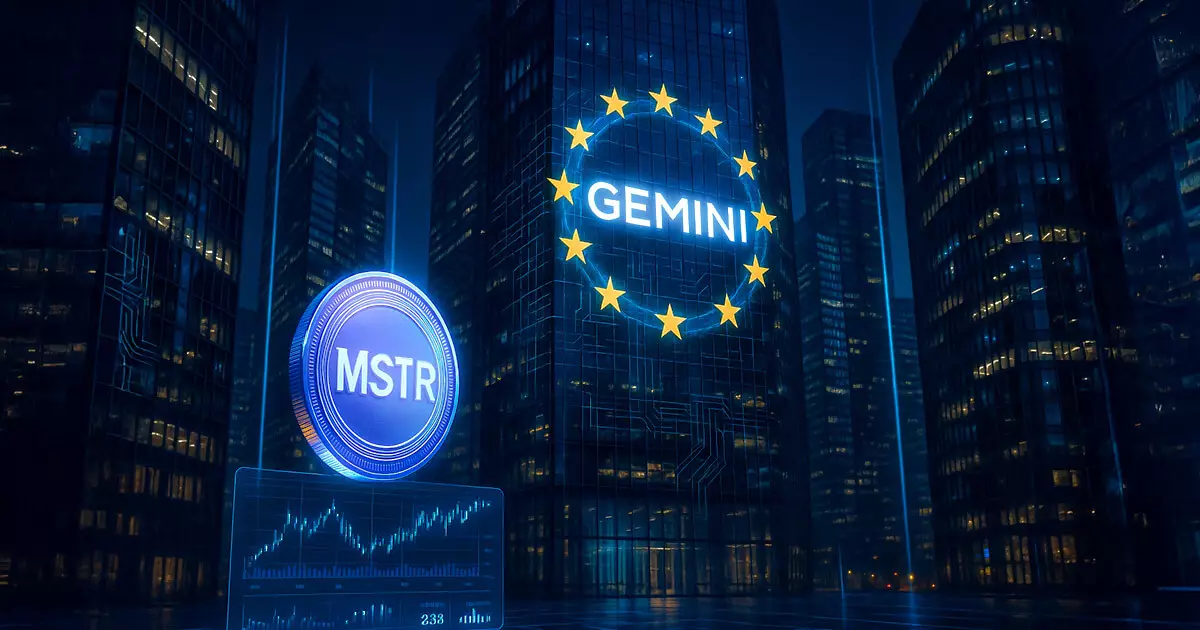Gemini’s recent introduction of tokenized shares of Strategy (MSTR) stock to EU customers represents more than just a novel gimmick in finance—it’s a bold attempt to dismantle the barriers that have long separated global investors from the lucrative world of U.S. equities. By leveraging blockchain technology, Gemini is effectively turning fractional ownership of prestigious American stocks into digital tokens accessible anytime and anywhere with just a smartphone. This is an overdue shift toward genuine democratization in markets that have traditionally been skewed toward well-connected, often wealthy investors who navigate complex brokerage networks and costly currency exchanges.
While the democratization rhetoric is appealing, it’s important to maintain a skeptical lens: fractional stocks and easier access have existed in conventional brokerage platforms for years. Gemini’s blockchain approach adds value primarily through 24/7 liquidity and potential transparency, yet these benefits might be overstated if not coupled with solid investor protections and regulatory clarity. Blockchain does not automatically guarantee better outcomes for retail investors, who remain vulnerable to volatility and potential technical hurdles in managing digital assets. Nonetheless, Gemini’s initiative signals an undeniable push to modernize and expand access, a step in the right direction for market inclusivity.
Blockchain as the New Financial Backbone?
Gemini’s decision to deploy their tokenized shares on the Arbitrum network aligns with the broader ambition of embedding traditional finance within decentralized infrastructure. Utilizing layer-two solutions aims to reduce transaction costs and accelerate settlement times—a direct response to the sluggish, sometimes expensive reconciliations of legacy clearinghouses. In theory, this innovation could not only cut friction but enable seamless cross-border transactions where national borders no longer confine investing opportunities.
However, this vision remains partially aspirational. Blockchain networks must grapple with scalability, security, and regulatory scrutiny, especially when handling real securities. Gemini’s compliance-focused approach is laudable, yet it underscores the complexity of marrying decentralized technology with established legal frameworks. If regulators tighten oversight or disagree with tokenized equity structures, the entire model might face hurdles greater than anticipated. Thus, while blockchain is a promising backbone, it still requires robust institutional buy-in and cooperation from traditional market actors to fulfill this role.
Implications for Sovereignty and Financial Autonomy
The ability to “export U.S. equities across the globe” through tokenized shares touches on profound issues of financial sovereignty. In many regions, investors face prohibitive brokerage fees, currency conversion hurdles, and limited access to high-performing markets. Gemini’s model promises borderless financial inclusion—capital in a developing economy can more directly participate in the growth of U.S. tech and innovation sectors without intermediaries siphoning value.
Yet, this borderlessness also raises questions about regulatory jurisdiction and investor protection. Cross-border securities ownership through blockchain could blur lines of accountability, making oversight cumbersome and potentially enabling regulatory arbitrage. For center-right liberalism, which values rule of law and market integrity, these risks cannot be ignored. Balancing the innovation of decentralized finance with robust, transparent regulations is essential to ensure that broadening access doesn’t come at the expense of security and fairness.
The Real Economic Benefits Behind Fractional Tokenized Shares
Tokenized stocks promise enticing upgrades to the investor experience: fractional ownership unlocks entry points previously out of reach for small investors, direct on-chain settlement removes delays, and reduced transaction friction lowers costs. These factors could revolutionize portfolio diversification, enabling retail investors to craft bespoke exposure across a wider array of stocks and ETFs.
But practical challenges remain. Fractional tokens rely on robust custodial guarantees that the digital tokens are fully backed by real securities—a promise that demands constant vigilance to prevent mismanagement or fraud. Moreover, liquidity assurances are critical: while crypto markets operate 24/7, the liquidity for specific tokenized equities may not match that of the underlying stocks, potentially introducing price distortions and increased risk.
Gemini is pioneering a path many traditional brokers may eventually follow, but ongoing education and transparency will be key to ensuring retail investors truly reap these benefits rather than getting caught in hype or technical pitfalls.
Institutional Interest: A Sign of Maturity or Merely a Buzzword?
Gemini’s launch is riding a wave of rising institutional curiosity around merging securities settlement with blockchain rails. This interest arguably validates tokenized equities as a legitimate innovation rather than a fleeting novelty. Institutions seek faster, cheaper custody and settlement solutions while maintaining regulatory compliance—requirements that Gemini evidently targets with its compliant approach and trusted partnerships like Dinari.
Nonetheless, institutional adoption is far from assured. Skepticism within traditional finance over blockchain’s reliability persists, and the pace at which markets will fully integrate tokenized securities remains uncertain. If Gemini’s model can prove resilience and compliance, it may become a blueprint—if not, it risks relegation to a niche experiment without mass appeal.
Ultimately, Gemini’s initiative is a compelling blend of technological optimism and strategic pragmatism. Whether it materializes as a transformative force in global investing depends on execution and the watchful eyes of regulators, investors, and market infrastructure alike.















